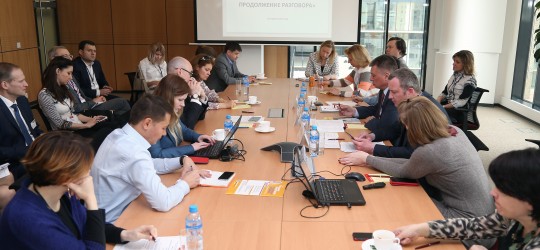FAS and the Corporate Counsel Association discussed legalizing parallel import in Russia and EAEU
On 19 April 2016, Deputy Head of FAS Andrey Kashevarov and representatives of FAS Department for Control over Advertising and Unfair Competition took part in the Round Table organized by the Corporate Counsel Association to discuss parallel import in Russia and EAEU, effects upon localization and new approaches to unfair competition.
The meeting started with a report by Andrey Kashevarov on parallel import. Deputy Head of FAS pointed out that parallel import has been discussed since long, already four years, and outlined the main changes in this field. Then he illustrated with the examples of the pharmaceutical and car manufacturing industries that prices for the products imported to Russia can significantly exceed the prices fixed by producers and official importers for other countries. The reason is producers’ attention to paying capacity and demand in a particular country.
Then discussion concerned the list of goods for which FAS finds it necessary to introduce an international principle of exhausting rights: first of all, medicinal drugs and products and spare parts for cars.
Andrey Kashevarov pointed out that on 13 April 2016 EEC Inter-government Commission signed a decision that changes must be drafted to Article 16 of the Treaty on the Eurasian Economic Union enabling to introduce international exhaustion of rights in relevant cases. Nevertheless, particular goods groups, regarding which parallel import may be legalized, are not yet approved. The changes can take place though exemptions from the regional right exhaustion principle for particular groups of goods. He specified that there is no clarity when the amendments may be adopted.
The process of determining the goods groups, discussed within the Eurasian Economic Union, can be quite simple: “Each country makes its proposals on the groups of goods, discrepancies are discussed additionally. The list is adopted by a decision of the Inter-government Council. The criteria and procedures for selecting goods groups are discussed by a EEC Working Group. Andrey Kashevarov said that FAS proposes to analyze decision-making on a particular goods group, taking into consideration whether there is 1) dependency on import, and 2) price differential.
Members of the Corporate Counsel Association, representatives of business, expressed their concern with regarding different approaches to different goods. The speaker responded that “currently around 96% of imported products are brought to Russia without consent of the right-holders, since they do not introduce any prohibitions”.
Deputy Head of FAS emphasized two main risks of legalizing parallel import: threat to investments and counterfeit. To protect consumers from counterfeit an additional customs station should be establish where an importer should confirm the goods originality. Thus, the procedure for official importers will not change and a window is opened for official importers.
Answering a question whether any mechanism for informing consumers that the goods were brought in by a parallel importer, the speaker was not convinced that such a mechanism (for instance, labeling the goods) would work “especially since the consumer rights are not breached because parallel-imported goods are original”.
Next item on the agenda was localization. According to the Head of FAS, based, as he stated, on a conclusion of Skolkovo experts, legalizing parallel import will not contradict the WTO standards. The regional right exhaustion principle can be maintained for those producers who have localized their production in Russia. Prior to changes coming into force, such producers will be given a transitional period during which they may apply and inform about localization.
There was also a question whether the planned amendments violate patent rights. Andrey Kashevarov answered that in this case globally the issue also is about exhausting patent rights, although the amendments will not concern patents directly. In his opinion, patent “in fact is realized in the produced goods. If the goods are alienated by producers, they can be imported to Russia on legal grounds. Patents are essential in case of forced licensing and at the localization stage”.
Another question related to unifying registration requirements for drugs. Deputy Head of FAS pointed out that the Antimonopoly Service is oriented, particularly, towards EC experience in this filed. Drugs can be either repackaged or producer can simply put an additional insert that comply with Russian antimonopoly law. He reminded that “the previous law on drug circulation already laid down a parallel import mechanism”.
Participants asked a question why drug prices cannot be reduced by registering prices for vital and essential drugs. Andrey Kashevarov pointed out that the methods for calculating the ceiling prices require considerable refining. Particularly, rather than fixing prices for particular drug, the ceiling prices for the drugs with International Non-Proprietary Name should be set hat can be reviewed quarterly because market conditions can change rapidly.









